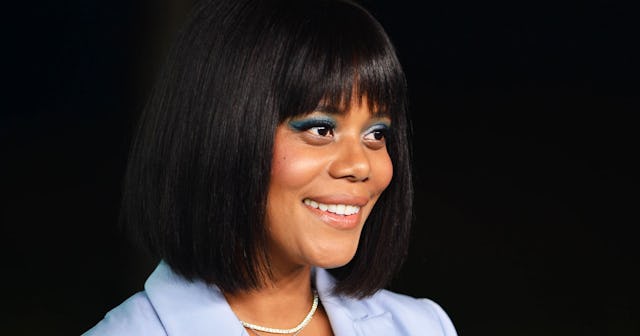‘Insecure’ Star Christina Elmore Chose An All-Black Care Team For The Birth Of Her 2nd Child

For most people, bringing a child into the world is one of the most memorable moments of their life. For some women, it can be one of the scariest. For women of color, Black women especially, the fear is often unparalleled. The racial disparities in healthcare when it comes to the type of care pregnant women receive should honestly not shock anyone at this point. And with the racial climate hotter than ever, more and more Black women are choosing to work with healthcare professionals that “look like them.” In an essay written for Women’s Health Magazine, “Insecure” star Christina Elmore speaks on why she chose to go with an all-Black care team for the birth of her second child.
“I found out that I was pregnant on the day that George Floyd died,” the actress wrote. “And it was a weird feeling. I was mourning and rejoicing at the same time. It was a really hard time to be Black in America. I would choose to be Black every time, but it was hard to see that this country wasn’t made for us. I was bringing another Black life in this country, and I wanted the experience to be different for him. I wanted him to be caught by Black hands that would be able to give me the care I deserved.”
Elmore’s desires speak for the volumes of African American women who have begun to seek professional care from Black healthcare workers. Systemic medical racism often leaves Black women feeling unseen and unheard in their pregnancies. According to the CDC and U.S. Department of Health and Human Services, Black women are three to four times more likely to die after giving birth than white women. In some places like Chicago, Illinois. the number can be up to six times more likely to die. The strong Black woman trope has detrimental affects on the care that African American women receive throughout pregnancy and following the birth of their children – a time when many women still need to be monitored by healthcare professionals.
Black women are more likely to have their pain overlooked and fears during pregnancy ignored. They are also less likely to be monitored closely for things like preeclampsia, and high blood pressure though they are more likely to develop these issues. “I wanted to feel like my worries and my pain would be heard and that I wouldn’t have to be translating while talking about fibroids, which I and many Black women have, or my fear of a C-section because of keloid scars, which people with darker skin are more susceptible to developing. Keloid scars aren’t necessarily dangerous, but they can be uncomfortable and restrict movement in the area,” Elmore wrote in her article.
Christina Elmore is not the first Black woman with fame to speak out about the inequities in the childbirth field when it comes to Black women. Serena Williams spoke openly with Vogue magazine in 2018 about the birth of her daughter. Williams’ recounted her experience with a pulmonary embolism and how the hospital staff ignored her concerns and brushed her off as “confused” from pain medication. Only after checking her for several other issues did they comply with her requests for a CT scan and found she had several small blood clots in her lungs.
It remains true that Black women are more likely to have inadequate access to quality healthcare, but in cases like global superstar Serena Williams, one can’t help question, do statistics like that even matter? Even world fame could not overshadow the fact that in America’s hospital room, Serena was a Black woman. Degrees, insurance, nor social status matter more than the color of your skin when it comes to the care that you receive. So it should come as a surprise to no one that Elmore chose a medical team she felt would have her best interest at heart.
For women with normal (not high-risk) pregnancies, options outside of a traditional hospital birth have become much more appealing. Home births, birthing centers and midwives are all routes new parents may consider when looking into forming their care plan. You could also, like Elmore, consider hiring a doula. Doulas are trained to assist and advocate for the family during childbirth and at times help during the postpartum period as well.
“I want women to understand that we have options around birth,” Elmore concludes. “There’s no wrong way. I hope that other women are able to feel empowered as possible, and listened to and valued as I did. Because we all deserve that.”